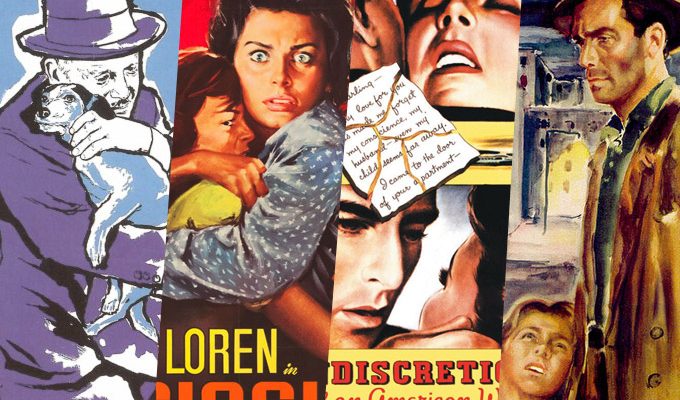 There were many different Vittorio De Sicas. The Italian maestro (and for once the word feels earned and not just thrown in there to show off the speaker’s Italophilia) was not just the revered director of indelibly authentic neo-realist classics that put forth a progressive social agenda, he was also an inveterate gambler who often got into such debt he’d accept subpar material — sex comedies and soap operas — to make money. He was not just a once-divorced Roman Catholic, he was and remained the patriarch to his two families, even to the point, reportedly, of having one household set the clock back by two hours so he could celebrate the turn of New Year in both. He was not just a four-time Academy Award-winning director, whose “Shoeshine” helped establish the Foreign Language category in the first place, he was also an Academy Award-nominated actor (he got his nod for “A Farewell to Arms“) with over 150 acting credits to his name, including a career peak in Max Ophuls‘ wonderful “The Earrings of Madame De….” Oh, and his brother-in-law killed Trotsky.
There were many different Vittorio De Sicas. The Italian maestro (and for once the word feels earned and not just thrown in there to show off the speaker’s Italophilia) was not just the revered director of indelibly authentic neo-realist classics that put forth a progressive social agenda, he was also an inveterate gambler who often got into such debt he’d accept subpar material — sex comedies and soap operas — to make money. He was not just a once-divorced Roman Catholic, he was and remained the patriarch to his two families, even to the point, reportedly, of having one household set the clock back by two hours so he could celebrate the turn of New Year in both. He was not just a four-time Academy Award-winning director, whose “Shoeshine” helped establish the Foreign Language category in the first place, he was also an Academy Award-nominated actor (he got his nod for “A Farewell to Arms“) with over 150 acting credits to his name, including a career peak in Max Ophuls‘ wonderful “The Earrings of Madame De….” Oh, and his brother-in-law killed Trotsky.
And yet we really know him today because of “Bicycle Thieves.”
That is not to do down the rest of De Sica’s remarkable directorial output (indeed there are probably other titles of his that we’re more enamored of) but to pay due respect to the colossal, monolithic reputation of “Bicycle Thieves” as not just the greatest Italian neo-realist movie, but the movement’s defining text and a frequent poll-topping candidate for Greatest Film Ever Made. All hyperbole and listifying aside, the beautiful, extraordinarily humanist “Bicycle Thieves” would by itself indeed be enough to build a legacy on — but there is so much more beyond it in De Sica’s canon.
We’ve long looked for a reason to explore his legacy further, and now the good people at Film Forum NY have supplied one: they’re running a retrospective of De Sica’s work, which includes all of the below titles and more, until October 8th. Whether or not you can make it to any of those screenings (and we should emphasize that seeing De Sica on the big screen is always, always worthwhile), if you want to explore the lesser seen, though not necessarily lesser, films of Vittorio De Sica, here are the ten we’d consider essential.
 “The Children Are Watching Us” (1944)
“The Children Are Watching Us” (1944)
Before “Bicycle Thieves” had its definitive take on fathers and sons, and long before “Stazione Termini” showed a more forgiving view of unfaithful wives, De Sica, working for the first time with longtime collaborator Cesare Zavattini, essayed these themes in this deeply compelling drama. Here he dallies with a less realist, more impressionist style, even incorporating a fever-dream sequence in which the central young boy Prico (Luciano De Ambrosis) conflates reality with memory and longing for the mother who has (temporarily) abandoned him. Yet there’s great authenticity in the child’s emotional journey, with De Sica really capturing the small boy’s incomprehension at the adults around him, even while making us acutely aware of exactly what every coded phrase and weighted glance means. Morphing into a kind of proto-“Kramer vs Kramer” (though actually more tragic, if you can conceive) in the development of the father/son relationship, it is perhaps marred only by its portrayal of the mother, later on especially, as a shade too self-interested for belief, and the father as a shade too saintly. Still, perhaps these extremes are necessary to give such power to the ending: it is simply Prico turning and walking away at a certain juncture, but it floors you.

